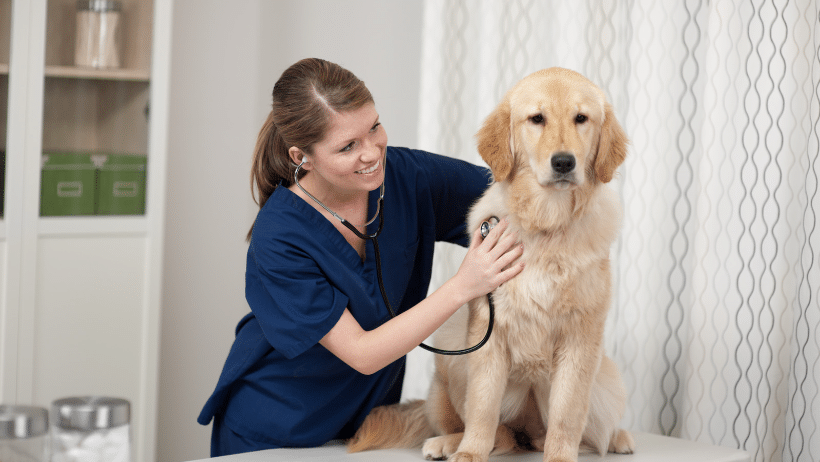
If you have ever experienced a urinary tract infection (UTI), you know how painful and uncomfortable it can be. But did you know that dogs can also get UTIs? In fact, UTIs are common in dogs, especially in older dogs and certain breeds that are prone to urinary tract stones. A UTI is an infection caused by bacteria that enter the urinary tract through the urethra and multiply in the bladder or kidneys. UTIs can affect any part of the urinary system, but they are more common in the lower urinary tract (bladder and urethra).
How do you know if your dog has a UTI?
Some of the signs and symptoms of a UTI in dogs are:
- Frequent urination or attempts to urinate
- Straining or difficulty urinating
- Blood in the urine
- Cloudy or foul-smelling urine
- Licking of the genital area
- Fever
- Loss of appetite
- Lethargy
- Incontinence or accidents in the house
If you notice any of these signs in your dog, you should take him to the vet as soon as possible. A UTI can be diagnosed by a physical examination and a urinalysis, which is a test that checks for bacteria, blood, crystals, and other abnormalities in the urine. Your vet may also perform other tests, such as a urine culture, an ultrasound, or an x-ray, to rule out other causes of urinary problems or to check for complications.
Can Dog UTI Go Away on Its Own?
You may wonder if your dog’s UTI will go away on its own without treatment. The answer is no. A UTI is not likely to resolve on its own
- Kidney infection: This occurs when the bacteria spread from the bladder to the kidneys, causing inflammation and damage to the kidney tissue. Kidney infections can cause permanent kidney failure if not treated promptly.
- Bladder stones: These are hard deposits of minerals and crystals that form in the bladder due to changes in urine pH or concentration. Bladder stones can cause obstruction, irritation, inflammation, and infection of the urinary tract. They may require surgery to remove them.
- Sepsis: This is a life-threatening condition that occurs when the infection spreads throughout the body via the bloodstream. Sepsis can cause organ failure, shock, and death.
Therefore, it is important to seek veterinary care for your dog if you suspect he has a UTI. Your vet will prescribe antibiotics to kill the bacteria and clear up the infection. The duration and type of antibiotics will depend on the severity and location of the infection, as well as your dog’s age, weight, health status, and allergies. You should follow your vet’s instructions carefully and complete the full course of antibiotics even if your dog seems better.
How Do I Treat My Dog’s UTI at Home?
In addition to giving your dog antibiotics prescribed by your vet, there are some home remedies that you can try to help your dog recover from a UTI faster and prevent a recurrence. However, these home remedies are not substitutes for veterinary care and should be used only after consulting with your vet. Some of these home remedies are:
- Apple cider vinegar: This is a natural antibacterial agent that can help balance the pH of your dog’s urine and prevent bacterial growth. You can add one teaspoon (for small dogs) or one to two tablespoons (for large dogs) of apple cider vinegar to your dog’s water bowl twice a day for up to 10 days.
- Cranberry: This is a natural antioxidant that can prevent bacteria from adhering to the walls of your dog’s urinary tract and flush them out with urine. You can give your dog cranberry juice (unsweetened) or cranberry supplements (powder or capsules) according to his weight.
- Yogurt: This is a natural probiotic that can replenish the good bacteria in your dog’s gut and urinary tract and fight off bad bacteria. You can give your dog plain yogurt (no sugar or artificial sweeteners) as a treat or mix it with his food once or twice a day.
- Water: This is essential for keeping your dog hydrated and flushing out bacteria and toxins from his urinary tract. You should make sure your dog has access to fresh and clean water at all times and encourage him to drink more by adding some chicken broth or ice cubes to his water bowl.
- Diet: This is important for maintaining your dog’s overall health and preventing urinary tract problems. You should feed your dog a high-quality, balanced, and low-carbohydrate diet that meets his nutritional needs and avoids ingredients that can irritate his urinary tract, such as grains, corn, soy, wheat, artificial colors, flavors, or preservatives. You may also consider adding some supplements that can support your dog’s urinary health, such as vitamin C, omega-3 fatty acids, or glucosamine
What Can You Give a Dog for Urinary Tract Infection?
Besides antibiotics and home remedies, there are some over-the-counter medications that you can give your dog for urinary tract
- Pain relievers: These can help reduce inflammation and discomfort in your dog’s urinary tract. You can give your dog aspirin (10 mg per pound of body weight) or ibuprofen (5 mg per pound of body weight) once or twice a day with food. However, you should avoid giving your dog acetaminophen (Tylenol) or naproxen (Aleve) as they can be toxic to dogs.
- Antihistamines: These can help relieve itching and swelling in your dog’s genital area caused by a UTI. You can give your dog diphenhydramine (Benadryl) (1 mg per pound of body weight) every 8 hours. However, you should avoid giving your dog cetirizine (Zyrtec) or loratadine (Claritin) as they can cause urinary retention in dogs.
- Urinary acidifiers: These can help lower the pH of your dog’s urine and make it more acidic, which can inhibit bacterial growth and prevent bladder stones. You can give your dog methionine (DL-Methionine) (10 mg per pound of body weight) twice a day with food. However, you should avoid giving your dog cranberry products if you are using urinary acidifiers as they can have opposite effects on urine pH.
Can You Test a Dog for UTI at Home?
If you want to test your dog for UTI at home, you can buy a home test kit that measures the presence of nitrites, leukocytes, blood, or pH in your dog’s urine. These are indicators of infection or inflammation in the urinary tract. You can find these test kits online or at some pet stores. To use the test kit, you will need to collect a fresh urine sample from your dog using a clean container or a plastic bag. Then, you will dip the test strip into the urine sample and wait for the color change according to the instructions on the package. You will compare the color of the test strip with the color chart provided to determine if your dog has a UTI or not.
However, these home test kits are not very accurate or reliable and may give false positive or negative results. They also do not tell you what type of bacteria is causing the infection or if there are any complications such as kidney infection or bladder stones. Therefore, it is always better to take your dog to the vet for a proper diagnosis and treatment if you suspect he has a UTI.





